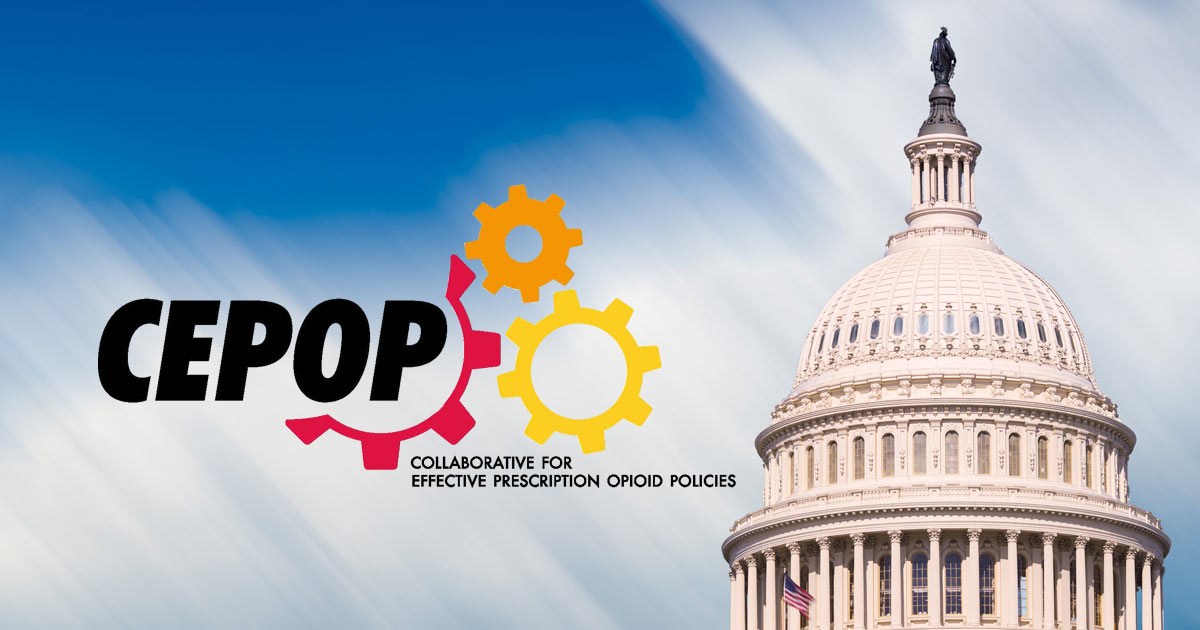TOMORROW: CEPOP Policy Roundtable on Expanding Naloxone Access in Schools
CEPOP is hosting a Policy Roundtable on Expanding Naloxone Access in Schools on Tuesday, October 10th at 3:00pm ET. We are pleased to be joined by thought leaders across the federal and county agency, national nonprofit and association, and school health service landscape. The Roundtable will focus on policies and programs to expand access to and availability of naloxone in school settings.
For more information, please contact Sanjyot Sangodkar at [email protected].
HHS-OIG Report on Medicaid Enrollees Access to Medication for Opioid Use Disorder
The Department of Health and Human Services’ Office of the Inspector General released a report reviewing medication for opioid use disorder (MOUD) for Medicaid enrollees. Using Medicaid claims data, HHS-OIG examined the prevalence of methadone, buprenorphine, and naltrexone to treat opioid use disorder. Most enrollees were treated using buprenorphine, with a quarter of diagnosed enrollees living in New York, Ohio, and Pennsylvania, and two-thirds of enrollees between the ages of 19 and 44. The report found that one-third of Medicaid enrollees with opioid use disorder did not receive MOUD. Additionally, the investigators saw racial disparities, with Black or African American enrollees with opioid use disorder less likely to receive MOUD. The report also identified ten states where enrollees were unlikely to receive MOUD. Ultimately HHS-OIG recommends the federal government continue to support, encourage and educate state programs and operations on the benefits of MOUD.
Articles & Resources
HHS-OIG Report — Many Medicaid Enrollees with Opioid Use Disorder Were Treated with Medication; However, Disparities Remain Present
FDA Issues Guidance on Stimulant Use Disorders and Treatment Development
On October 4th, the Food and Drug Administration (FDA) published new draft guidance on Stimulant Use Disorder (SUD) to support sponsors in developing treatments for SUD. Once finalized, the guidance will support the development of programs and clinical trial process for cocaine use disorder, methamphetamine use disorder and other stimulant use disorders. The guidance requests information regarding clinical trial designs to evaluate SUD, the development process, data collection, and methods for assessment. Dr. Marta Sokolowska, the Deputy Center Director for Substance Use and Behavioral Health at FDA’s Center for Drug Evaluation and Research (CDER), stated, “Currently there is no FDA-approved medication for stimulant use disorder. When finalized, we hope that the guidance will support the development of novel therapies that are critically needed to address treatment gaps…The guidance is one of the actions within the agency’s Overdose Prevention Framework, which includes appropriate prescribing of prescription stimulants as well as development of evidence-based treatments for stimulant use disorder.”
Comments are due December 4th, 2023.
Articles & Resources
FDA—FDA Takes Steps to Advance the Development of Novel Therapies for Stimulant Use Disorders
Federal Register—Stimulant Use Disorders: Developing Drugs for Treatment Draft Guidance for Industry; Availability
Bipartisan Legislation Introduced to Target Drugs Laced with Fentanyl
On Monday, October 3rd, Senators Cory Booker (NJ) and Ted Cruz (TX) introduced the Targeting Online Sales of Fentanyl Act. The legislation hopes to address online sales of counterfeit drugs that are laced with fentanyl. The bill requires the Government Accountability Office (GAO) to investigate enabling forces of the illegal online sale of counterfeit drugs and review actions of law enforcement and online providers to combat the issues. Last month, the Centers for Disease Control published research suggesting an increase in overdose deaths with evidence of counterfeit pill use and illicit manufactured fentanyl was found in 41.4% of the overdose deaths reviewed. Targeting Online Sales of Fentanyl Act is the latest among a series of bills attempting to tackle the overdose epidemic from counterfeit pills. Other legislation includes the Cooper Davis Act, SHOP SAFE Act of 2023, and the STOP Act and each bill has attempted to tackle a different aspect of the counterfeit pill crisis. Upon its introduction Senator Booker laid out the purpose of this bill stating, “The online sale of illicit drugs laced with fentanyl has had a devastating effect: drug overdoses now surpass suicide, traffic accidents, and gun violence as one of the leading causes of preventable death among people aged 18 to 45…This legislation will provide answers of how best to disrupt online drug distribution channels, helping lawmakers craft evidence-based solutions that effectively address the issue.”
Articles & Resources
Senator Cory Booker—Booker, Cruz Introduce Bipartisan Legislation to Target Online Sales of Illicit Drugs Laced with Fentanyl
CDC—Drug Overdose Deaths with Evidence of Counterfeit Pill Use—United States, July 2019-December 2021
What We Read Last Week
Several articles were published last week pertaining to the opioid epidemic, covering a variety of different components of the topic. Links to relevant articles are provided below.
Axios—Charted: Medical claims related to opioid dependence
Johns Hopkins—Methadone Is an Effective Treatment for Opioid Use Disorder, So Why Aren’t More Patients Using It?
NPR—An overdose drug is finally over-the-counter. Is that enough to stop the death toll?
NPR—Naloxone can save students’ lives, but not every school has it
Politico—‘It’s everywhere’: Fighting the war against fentanyl
Reuters—Consulting firm McKinsey to pay $230 million in latest US opioid settlements
United States Department of Treasury—Treasury Targets Sinola Cartel Fentanyl Trafficking Operations and a Colombian Cartel Leader
WTOP News—2 facing charges in connection with suspected fentanyl overdoses at Wakefield High School
This Week’s Calendar
In the week ahead, there are no relevant events or hearings noticed at this time. In the event that there are any changes to the schedule for this week, we will make additional information available.
Questions about the above content can be directed to [email protected].

